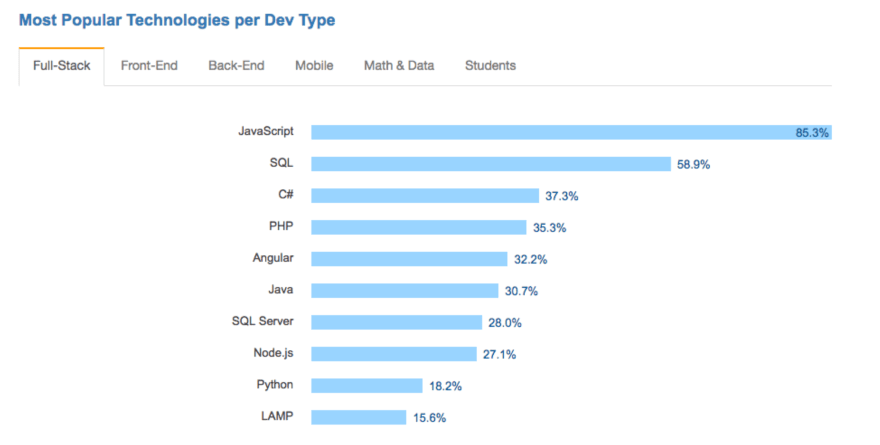It’s a good time to be a JavaScript developer.
The Internet IS JavaScript, and has been for over 20 years. Today it’s at every stage of a website or web app. And it’s not going away anytime soon. Any attempts to replace it have been largely futile. Remember Java Applets? Flash? VBScript?
JavaScript is so prevalent on the web that it’s impossible to replace — well, without breaking millions of web pages anyway. And with continuous updates and new versions, JavaScript continues to grow and evolve. Some alternate programming languages like Typescript are gaining popularity, but none have the support, free tools and community that JavaScript does.
If you’ve got JavaScript chops, there’s a developer job for you out there. But how do you stand out from the competition? Become a full-stack JavaScript developer.
JavaScript — not just for the web browser anymore.
Thanks to tools like Node.js, developers are enjoying JavaScript not just in your web browser, but on the server side, too.
It’s easy to see why many dev teams prefer using JavaScript as the single language for their web applications:
Your team will understand the source code a lot more easily with all parts written in JavaScript. Also, for larger projects, you could work with just one team instead of two — reducing the cost of finding and retaining talent.
You can save time by reusing and sharing the same code, libraries, templates and models on both the front end and back end. Don’t worry about knowing JavaScript utility equivalents in Python or Ruby. Just use the same utility on the server and in the browser.
Tools like Node.js are lightweight and built for speed, unlike a lot of other commonly used back end technologies. This can result in a faster web app.
It’s a lot easier to find a skilled JavaScript engineer to work on your back end, due to the popularity of the language.
Full-stack JavaScript is evolving quickly, and already has a strong following.
The Full-Stack JavaScript Developer Checklist
To be a fully functional full-stack JavaScript developer, make sure you have these things down pat:
JavaScript basics, preferably ES6 (the most recent version of the language). How else do you take JavaScript frameworks to their fullest potential without knowing the language itself?
At least one client-side framework, like Angular, React, or Vue.js. Most modern day JavaScript devs are using JavaScript frameworks extensively.
A knowledge of web browsers and how they work. The browser is your runtime environment for JavaScript. It pays to know all the development tools available inside your browser.
An understanding of databases like SQL or noSQL. Full-stack developers of any kind need to know how data is stored and manipulated.
Node.js. It’s the first, (and arguably most preferred) JavaScript runtime environment on the server side. Even if you don’t use it for your main server app, you can still use its tools to improve the development process. For example, you could use Mocha.js for unit testing, Grunt.js for automated build tasks, or Brackets for code editing.
And here’s what you should do:
Stay informed and up to date on what’s going on in the JavaScript world. With a huge development community and support from both Facebook and Google, staying up to date on JavaScript can be tough on your own. Subscribe to a resource like the DailyJS, or JavaScript Weekly.
Build something. To really understand how both sides work together — and bring focus to your JavaScript learning — it helps to have a project to tinker with.
You need a comprehensive JavaScript learning resource.
Our new interactive course, The Complete JavaScript Course: Build a Real-World App From Scratch, puts you on an accelerated path toward becoming a full-stack JavaScript developer. We hope to empower developers everywhere to get comprehensive knowledge on JavaScript. This course is created by Baptiste Pesquet, an engineer and computer science teacher based in Bordeaux, France.
Happy learning!








Top comments (2)
I don't have a problem with folks mentioning their work--but this 'blog post' is an ad, plain and simple. dev.to is now being used for free ad promotions. I had a feeling this was the direction it would head, but I didn't expect it to ramp up so quickly.
good job,friend!